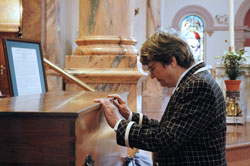Forgiveness is integral to resurrection experience, author says

St. Joseph Sister Helen Prejean of New Orleans prays before the remains of St. Theodora Guérin on April 13 at the Church of the Immaculate Conception at Saint Mary-of-the-Woods. Actress Susan Sarandon earned an Academy Award for her portrayal of Sister Helen in the 1996 movie version of her book, Dead Man Walking. The play by that name is now offered without charge to student groups to present on stage as an educational program. (Photo by Mary Ann Wyand)
By Mary Ann Wyand
SAINT MARY-OF-THE-WOODS—Respect everyone.
To do that, St. Joseph Sister Helen Prejean of New Orleans explained, you have to reflect on the Gospel teachings and consider both sides of the cross of Christ.
Jesus reaches out to us from the cross, Sister Helen noted, to remind us to respect the sanctity and dignity of all human life—even the lives of murderers.
“A crucifix is so much a part of our faith,” she said during an interview on Easter Monday, April 13, at the motherhouse of the Sisters of Providence. “There’s one in every church, and I had never thought of it as the symbol of execution until I got involved with the people on death row.”
The author of Dead Man Walking and The Death of Innocents—An Eyewitness Account of Wrongful Executions said she is writing her third book, River of Fire, about her spiritual journey to death row.
“I love being here [at Saint Mary-of-the-Woods],” Sister Helen explained. “This was my place of awakening. This was my [experience of] St. Paul being thrown off the horse and getting into the Gospel of Jesus.”
Her spiritual conversion began when the Sisters of St. Joseph of Medaille in New Orleans traveled to Saint Mary-of-the-Woods during the summer of 1980 for a retreat on the Gospel and social justice led by Notre Dame de Namur Sister Marie Augusta Neal.
“I was fighting [the retreat] every inch of the way up here on the bus,” Sister Helen recalled. “This had been bottling up in the community about social justice being an integral part of the Gospel. I thought charity was fine. I said, ‘We’re nuns. We’re not social workers. … I’m spiritual. I’m apolitical.’ … On the second day, Sister Marie Augusta said, ‘Jesus preached good news to the poor’ [Mt 11:5, Lk 7:22]. … She said integral to the Good News to poor people was that they would be poor no longer. … She said that not to take a stand on the issues where injustice is involved is to support the status quo.
“I was about prayer and being spiritual, … but I realized that to follow Jesus, to really imitate Jesus, I had to get in touch with the poor,” she said. “They were right at my back door at our motherhouse in New Orleans. There were 10 major housing projects. … I moved into the St. Thomas housing project and began to live as neighbor with African-American people. The way they were Christ to me taught me what it means to be Christ to others. And, of course, it was the Gospel opening up to poor people that got me to death row. … I became grateful and then I wanted to serve the poor there.”
In 1982, Sister Helen began serving as the spiritual adviser for death-row inmate Patrick Sonnier, who was convicted of killing two teenagers and sentenced to die in the electric chair at the Angola State Prison in Louisiana.
Their friendship and his execution led her to write Dead Man Walking in 1993, which became a national bestseller then a movie in 1996.
“Forgiveness is so integral … to the experience of resurrection,” Sister Helen explained. “The victim and family members are on one side [of the cross] and the perpetrator and family members are on the other side. Christ reaches his hands out to everyone. The Gospel is that comprehensive. [But] our culture loves dualities and polarities, one side or the other. ‘You kill, you die.’ Enemies have to be killed. But reconciliation goes to a place that is beyond understanding.”
In New Jersey, she said, the relatives of 62 murder victims testified before judicial committees to help end the death penalty.
“That is what helped New Jersey do away with the death penalty,” Sister Helen said. “Without their voices, without their witness, that would never have happened. God worked through those people.”
On April 14, Sister Helen spoke during Human Rights Day at Indiana State University in Terre Haute.
She also presented a keynote address on “What’s Next for the Faith-based Anti-Death-Penalty Movement?” on May 7 at the Associated Church Press convention in Indianapolis.
Her personal conversation with the late Pope John Paul II about ending the death penalty was reported throughout the world.
The pope changed the text of the Catechism of the Catholic Church to include the statement that the death penalty should be rare, if not nonexistent, because society has the means to protect people from violent offenders with prison sentences.
“Practically speaking, we’re beginning to shut the death penalty down in the United States,” Sister Helen said.
“Sixty-four percent of the American public does not support the death penalty. There is a huge regional disparity between the deep South states that practiced slavery and now do 80 percent of the executions, and other parts of the country.
“The death penalty is really based on the assumption that there are some people who are not fit to live among us,” she said. “We make a judgment. … Our God is a God of life. We have to be people for life. The way of Jesus is always the way of persuasion and the way of community support and the way of love.” †
